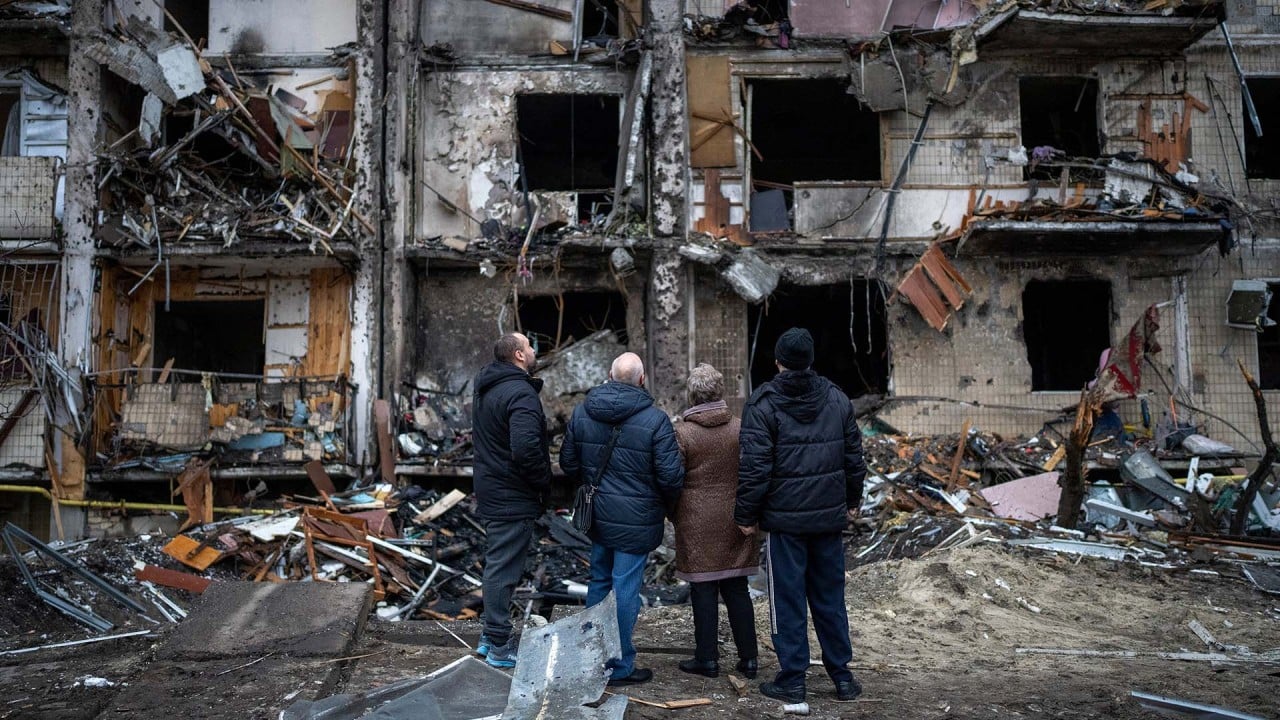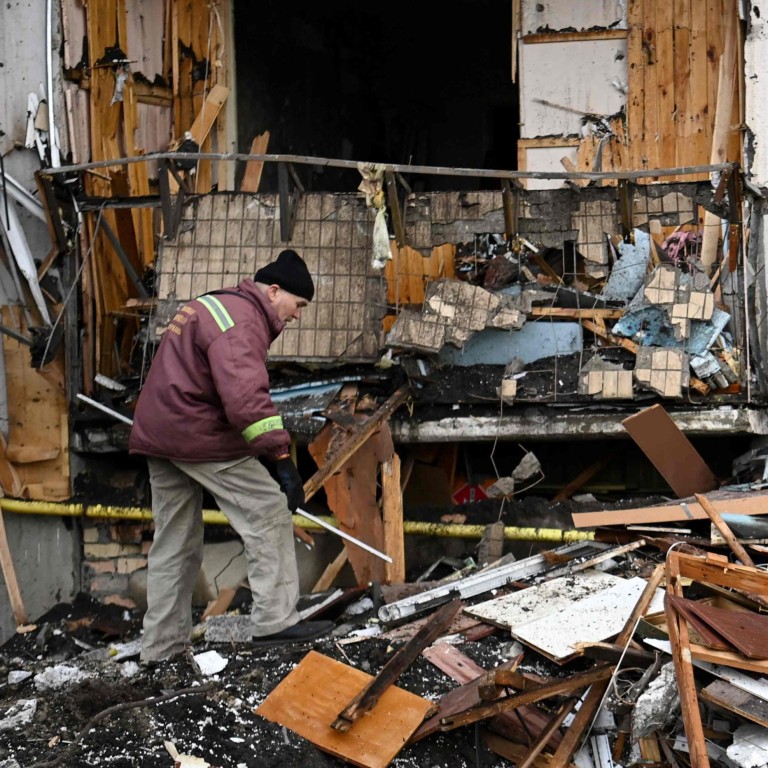
Ukraine invasion: US and EU sanction Putin and his top envoy after Russian troops enter Kyiv
- White House says it would take steps against Russian President Vladimir Putin and Foreign Minister Sergey Lavrov ‘in alignment and coordination’ with Brussels
- Nato condemns Russia ‘in the strongest possible terms’ in an emergency meeting
Nato, meanwhile, condemned “in the strongest possible terms” Russia’s moves, with Ukrainian President Volodymyr Zelensky accusing Russia of targeting civilian areas.
The EU sanctions followed Zelensky’s criticism of the bloc’s leaders for what he considered a weak response to the Russian invasion, warning that Moscow’s attacks should be seen as “the beginning of a war against Europe”.
Read on for updates as events develop.
Following abstention at UN, China calls for diplomacy
After it abstained from a vote at the United Nations Security Council on a resolution condemning Russia’s invasion of Ukraine, China urged all parties to “return immediately to the track of diplomatic negotiations,” without criticising Moscow’s actions.
“Ukraine should become a bridge between the East and the West, not an outpost for confrontation between major powers,” Zhang Jun, China’s envoy to the United Nations, said following the vote, which failed due to a veto from Russia.

Without offering an explicit explanation for China’s abstention decision, Zhang said that any actions taken by the Security Council “should be truly conducive to defusing the crisis, rather than adding fuel to fire.”
Russia’s envoy thanked those who did not vote for the resolution – China, India and the United Arab Emirates – and reiterated the Kremlin’s claims that its military action against Ukraine was aimed at liberating the country from “Nazis” in its government.
Russia vetoes UN resolution, China abstains
A United Nations Security Council resolution condemning Russia’s attack against Ukraine and calling for an immediate withdrawal of Russia forces from the country has failed to pass, following an expected veto by Russia. China, India, and the United Arab Emirates abstained from the vote.
Russia’s veto was met with scorn from other members of the 15-member council, including the United States, whose UN envoy vowed to bring the matter to the wider General Assembly, where the veto rule does not apply.

“You can veto this resolution, but you cannot veto our voices,” said Linda Thomas-Greenfield following the failed vote. “You cannot veto the truth. You cannot veto our principles. You cannot veto the Ukrainian people. You cannot veto the UN Charter. And you will not veto accountability.”
Canada to sanction Putin, other Kremlin officials
“These men bear the greatest responsibility for the death and destruction occurring in Ukraine,” said Trudeau at a press briefing on Friday.
Ukraine says it consults with Russia on potential negotiations
Following claims by Moscow that Ukrainian officials had rebuffed an offer to negotiate, a spokesman for Ukrainian President Volodymyr Zelensky has refuted the reports, saying that Kyiv has agreed to a proposal for negotiations.The two sides are in talks about the place and time of the negotiation process, the spokesman, Serhiy Nykyforov, said on Facebook. “The sooner the negotiations begin, the more chance there will be to restore normal life”.
Ukraine’s ambassador to Israel, Yevgen Korniychuk, told the New York Times that Kyiv has asked Israel to host the potential talks. “We do believe that Israel is the only democratic state in the world that has great relations with both Ukraine and Russia,” Korniychuk said, adding that Israel had yet to give an answer to the appeal.
US to sanction Putin and Lavrov
White House Press Secretary Jen Psaki said that US President Joe Biden’s administration would sanction Putin and Lavrov, “in alignment and coordination” with the European Union, as part of efforts to halt Russia’s invasion of Ukraine.
A travel ban would be part of the sanctions, further details of which would be announced later on Friday, Psaki told reporters in a briefing.

She declined to say whether sanctions would also involve excluding Russia from the Swift interbank messaging system, which facilitates international payment transfers - only that the administration is not taking that option off the table.
Humanitarian costs of invasion mount
Martin Griffiths, the United Nations undersecretary general for humanitarian affairs, said that hundreds of thousands of Ukrainians are on the move with many more expected as the crisis unfolds.
This follows estimates by the Biden administration and Unicef that a full-scale invasion could displace up to 5 million people. Some 50,000 have already left Ukraine in the first 48 hours, most to Poland and Moldova, the UN refugee agency said.
Beyond the numbers, the crisis is expected to create serious secondary problems. Some 50 per cent of the wheat that the relief agency World Food Programme distributes comes from Ukraine, Griffiths said, while higher fuel, food and related costs will strain relief efforts globally.
Foreign minister sketches China’s stance on invasion
In calls with his British and European Union counterparts, Chinese Foreign Minister Wang Yi has laid out Beijing’s position on Russia’s invasion of Ukraine, stressing that the current situation was “not what we want to see” but offering no explicit criticism of Moscow’s actions.

Wang said that China has consistently advocated for the protection of all countries’ territorial sovereignty, adding that no country’s security should come at the expense of damaging that of another country, according to a Chinese government readout of the calls.
But he reiterated Beijing’s position that Russia’s concerns about the expansion of Nato were legitimate and should be worked out through negotiations.
Wang did not address speculation about how China will vote in a United Nations Security Council motion to condemn Russia’s invasion that is scheduled later on Friday, but said that Beijing was opposed to any actions by the council that would “add fuel to the fire” rather than reduce the temperature of the crisis.
Britain set to sanction Putin and Lavrov
Britain is set to unveil sanctions against Russian President Vladimir Putin and foreign minister Sergey Lavrov, British Prime Minister Boris Johnson has told Nato members. The move would follows similar steps by the European Union.
There could be “no normalisation of relations with Russia after this act”, Johnson said at Friday’s emergency meeting of the security alliance, according to a British government readout of the remarks.
Russia faces bans from sports, cultural events
Russia is finding itself ostracised from sporting and cultural events, ranging from the Champions League to the Eurovision song contest, over its actions in Ukraine.
On Friday, Uefa, the European football governing body, stripped St Petersburg of the Champions League final in May, shifting the match to France and Formula One cancelled the Russian Grand Prix set for September.
On top of that, the Eurovision song contest – a popular competition known for its over-the-top performances – said no Russian act would be allowed to participate in this year’s contest.
“We remain dedicated to protecting the values of a cultural competition which promotes international exchange and understanding, brings audiences together, celebrates diversity through music and unites Europe on one stage,” the European Broadcasting Union announced.
EU sanctions Putin and Lavrov
The European Union has sanctioned Russian President Vladimir Putin and his foreign minister Sergey Lavrov, for their roles in the brutal invasion of neighbouring Ukraine.
Putin joins Syria’s Bashar al-Assad and Belarus’ Alexander Lukashenko as the only world leaders to be sanctioned by the bloc.
This was the only remaining part of a sanctions package to be finalised on Friday evening, top diplomat Josep Borrell said at a press conference in Brussels following a meeting of the EU’s 27 foreign ministers.

It is part of a broader package of sanctions that includes bans on financial institutions from fundraising in European markets, sweeping export controls banning Russia from importing sensitive products in sectors including electronics, aviation, rail infrastructure, and oil refining.
Borrell told reporters that the EU had been lobbying UN Security Council members including China and India for their support on a condemnation of Russia tonight.
Nato condemns Russian attacks in emergency meeting
Nato has condemned “in the strongest possible terms” Russia’s invasion of Ukraine and Belarus’ involvement, following an emergency meeting of the security alliance’s heads of states.
“We call on Russia to immediately cease its assault, to withdraw all its forces from Ukraine and to turn back from the path of aggression it has chosen,” the security alliance said in a statement.
The alliance vowed that the world would hold Russia and Belarus accountable for their actions, and highlighted “significant additional defensive deployments of forces” in the eastern part of the alliance.

“Nato allies activated our defence plans and as a result we are deploying elements of the Nato response force on land, at sea and in the air,” Nato secretary general Jens Stoltenberg said in a press conference following the meeting.
Nato allies would continue to provide support to Ukraine, including air defence capabilities, Stoltenberg said, while Nato members were also working to strengthen their own defences against possible cybersecurity attacks by Russia.
Stoltenberg added that that cyberattacks on countries beyond Ukraine could trigger Article 5 of the Nato charter, the provision requiring member states to come to the defence of another Nato ally that is attacked.
Britain presses China to urge Russia to de-escalate
In the latest effort by Western nations to press Beijing to use its influence with Moscow to de-escalate Russia’s attack on Ukraine, British Foreign Secretary Liz Truss has spoken by phone with Chinese Foreign Minister Wang Yi, telling Wang that Russia’s actions were a “flagrant breach of the UN Charter”.
“As a permanent member of the UN Security Council we expect China to stand up for Ukraine’s sovereignty and territorial integrity,” Truss said on Twitter following the call.
The UN Security Council meets later on Friday to vote on a resolution condemning Russia’s invasion, a measure certain to be vetoed by Russia. Diplomats say at least 11 member states will vote for the resolution, with China’s decision unclear, Reuters reported.
UK summons Belarus ambassador over Ukraine
Britain’s Foreign Office summoned Maxim Yermalovich, Belarus’s ambassador to the United Kingdom, on Friday to discuss the Eastern European nation’s role in Russia’s invasion of Ukraine.
At the meeting, James Cleverly, the UK’s minister for Europe and North America, reaffirmed Britain’s commitment to the “independence, sovereignty and territorial integrity of Ukraine” and made clear Russia’s incursion would come at a severe cost to Russia’s economy, the Foreign Office said in a statement.
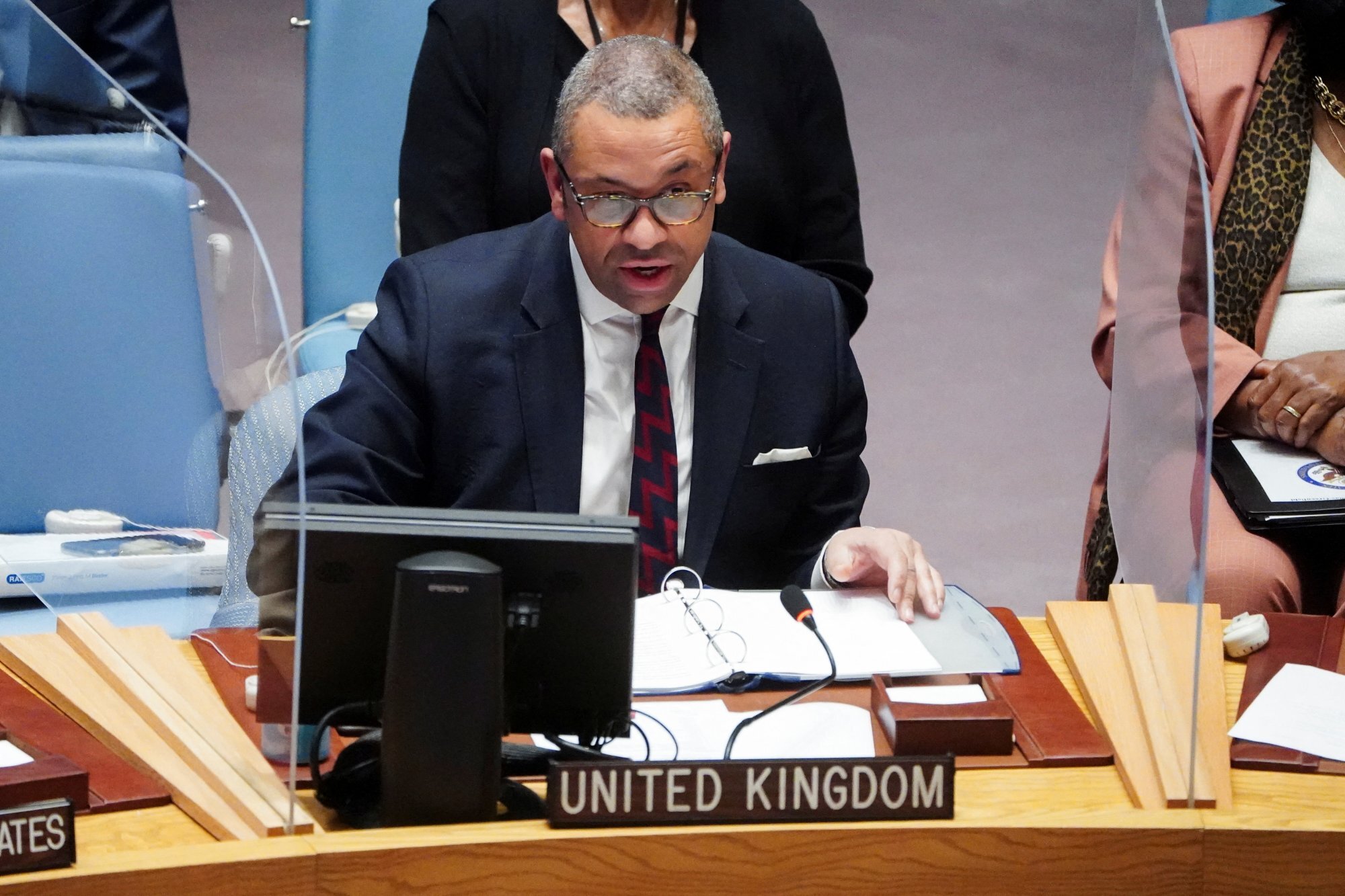
Cleverly added that UK sanctions against Russians would apply to Belarusian individuals, entities and organisations deemed to have aided Russia’s efforts.
“The UK condemns the role Belarus is playing in the Russian invasion of Ukraine. Belarus must stop supporting Russia’s illegal and unprovoked actions,” Cleverly said. “We must be united against Russian aggression.”
EU seeking to sanction Putin and Lavrov
EU foreign ministers are gathering in Brussels on Friday to finalise the latest tranche of Russian sanctions. Asset freezes for Putin and Foreign Minister Sergey Lavrov are on the agenda.
“Yes, Putin and Lavrov will be on the list,” foreign affairs chief Josep Borrell told reporters on his way into the meeting, but the vote requires unanimity.
German Foreign Minister Annalena Baerbock said she was “personally very much in favour …. but it’s not enough.”
“They are responsible for the death of innocent people in Ukraine … they will now be sanctioned severely by the European Union,” she said.
Borrell asks China to ‘exert influence’ on Russia
Borrell spoke with the Chinese government this morning in an effort to have them “exert influence” over Russia.
“I’ve been talking with the Chinese minister this morning. I’ve been asking him to exert their influence. I know that President Putin has been talking with President Xi,” Borrell said.

“I’ve been asking [for] the Chinese influence in order to respect the sovereignty and the integrity of everybody, including Ukraine, as the Chinese minister said in Munich the other day,” he added. “It has been a very constructive conversation with my good friend the Chinese minister.”
Borrell said that it was essential that the United Nations passes a vote Friday night condemning Russian aggression in Ukraine.
“We are going to embark, with my fellows ministers, in a diplomatic reach out to everybody in the world in order to build the majority of people voting in the General Assembly against Russia, to condemn Russia,” he said.
Negotiate with Ukraine, Xi Jinping urges Vladimir Putin
Moscow prepared to negotiate – but on its terms
Putin’s spokesman has said Russia is prepared to send a delegation to negotiate with Ukraine in the Belarusian capital Minsk – but under terms Kyiv is unlikely to stomach.
Kremlin spokesman Dmitry Peskov said a delegation from the ministries of defence and foreign affairs were prepared to meet their counterparts in Minsk, but that it would stick to its aim of “demilitarisation and denazification” of Ukraine.
Ukraine has offered to negotiate terms of “neutrality”, but has also vowed to fight to defend its territory from Russian aggression.
Russia says it seized airport near Kyiv
Russia says it has taken control of a strategic airport just outside the Ukrainian capital and cut Kyiv off from the west, the AP news agency reported.
The airport in Hostomel has a long runway capable of accommodating heavy transport planes. Its seizure allows Russia to airlift troops directly to Kyiv’s outskirts. Hostomel is just 7km (4 miles) northwest of Kyiv.
Russian defence ministry spokesman Major General Igor Konashenkov said Friday that the Russian airborne forces used 200 helicopters to land in Hostomel.
Nato must not take ‘active’ role, British minister says
Britain is sending additional troops to bolster its forces in Estonia earlier than expected and will explore “all we can do” to support Ukrainians, armed forces minister James Heappey said.
“But we must all in this House be clear that British and Nato troops should not, must not, play an active role in Ukraine,” Heappey told the Commons.
“We must all be clear what the risk of miscalculation could be and how existential that could very quickly become if people miscalculate and things escalate unnecessarily.”
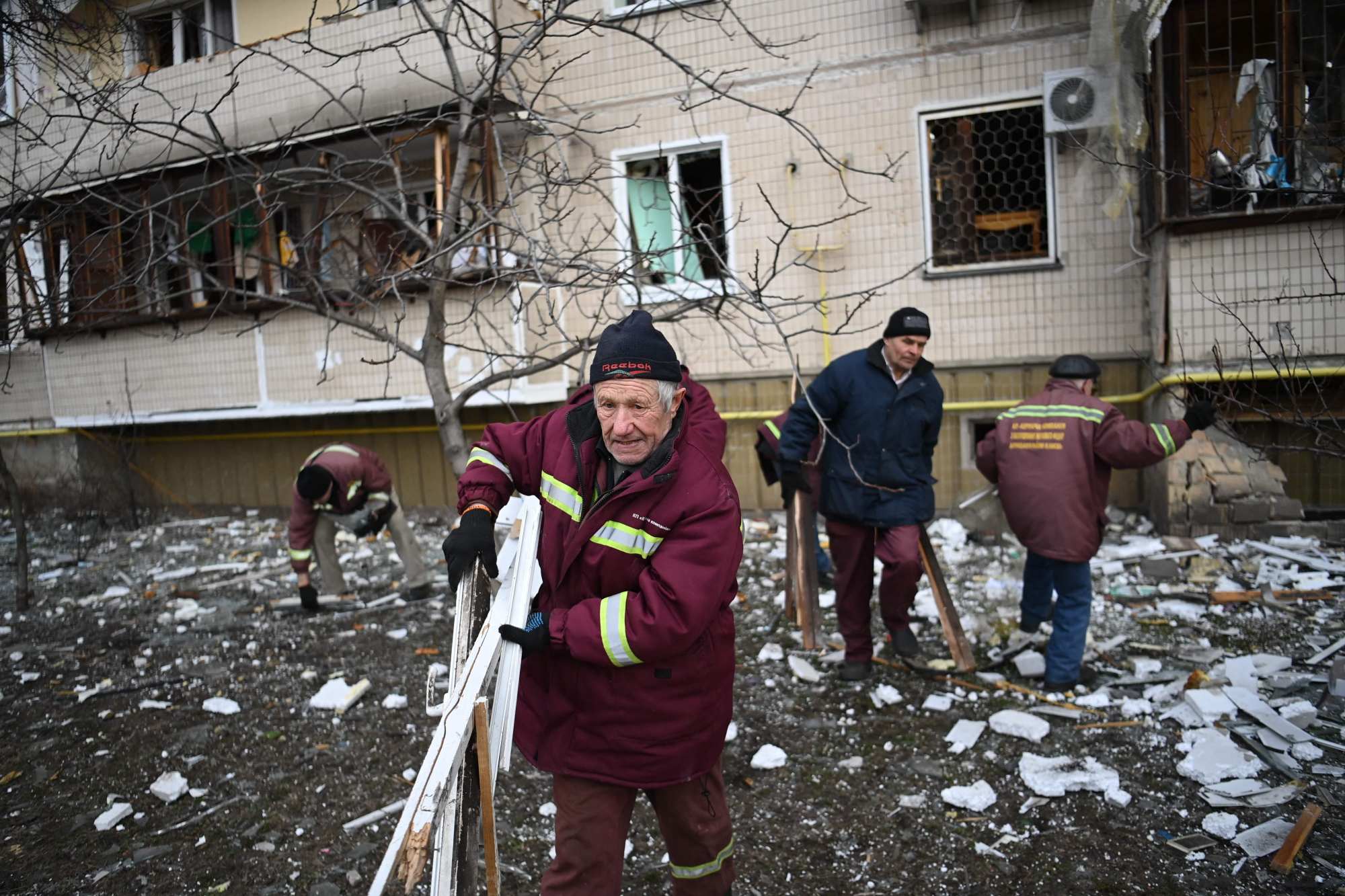
Zelensky slams European response to invasion
Zelensky criticised EU leaders for their response in a televised address in which he warned that the invasion should be considered as “the beginning of a war against Europe”.
“How do you plan on defending yourselves when you so slowly help us?” Zelensky asked.
“The German Chancellor yesterday talked about the invasion of Ukraine, that Europe had not seen something like this for 75 years. But this is not the entire truth.
“This is not only Russia’s invasion of Ukraine. This is the beginning of a war against Europe. Against European solidarity. Against elementary rights of European people.”

On a separate note posted on a government Telegram channel, Zelensky reiterated a call for negotiations with Russia.
“I want to again address the president of the Russian Federation. On the entire territory of Ukraine, there are battles. Let us sit at the negotiating table to stop the death of people.”
Xi supports negotiations in call with Putin
In a phone conversation with Putin, Xi said that China decides its position on Ukraine based on merit and that he backed efforts by the two countries to resolve the crisis through talks.
Xi said it was necessary to abandon the “Cold War mindset, and the legitimate security concerns of different nations should be respected”.
“China supports Russia negotiating with Ukraine to resolve the problem. China’s basic position on respecting the sovereignty and territorial integrity of all countries and abiding by the purposes and principles of the UN Charter is consistent,” Xi said.
In the conversation, Putin said that the United States and Nato had long ignored Russia’s reasonable security concerns and repeatedly reneged on their commitments. He said the US and Nato challenged Russia’s strategic bottom line.
EU discusses coordinated sanctions with Taiwan
The EU confirmed that it has been coordinating its response with Taiwan.
“Taiwan, as with other like-minded partners, has expressed strong support for Ukraine and condemned Russia’s use of force and announced it will impose sanctions. At this point, we are working with all like-minded partners,” spokeswoman Nabila Massrali told the South China Morning Post.
The self-ruled island announced on Friday it would join the United States and the Western world in hitting Moscow with sanctions.
Russia bans British flights
Russian authorities have banned British airlines and United Kingdom-registered aircraft from landing at its airports or crossing its airspace.
The move was taken in response to the UK government banning Russian carrier Aeroflot from flying to Britain on Thursday, according to Rosaviatsia, Russia’s civil aviation authority.
“This measure was taken in accordance with the provisions of the Intergovernmental Air Services Agreement between Russia and the UK as a response to unfriendly decisions of the UK Aviation Authorities regarding the restriction on regular flights of aircraft owned, leased or operated by a person associated with Russia or registered in Russia,” Rosaviatsia said in a statement.
Ukraine ready to negotiate, adviser to president says
An adviser to Zelensky has also said the country is ready to sit down for talks with Moscow, provided there are security guarantees.
Mykhaylo Podolyak said: “Ukraine has always left and leaves room for negotiations.
“Including now – even after Russia launched a full-scale invasion. This war must be stopped. These hostilities must be stopped,” he said in a note posted on news agency’s Unian’s Telegram channel.
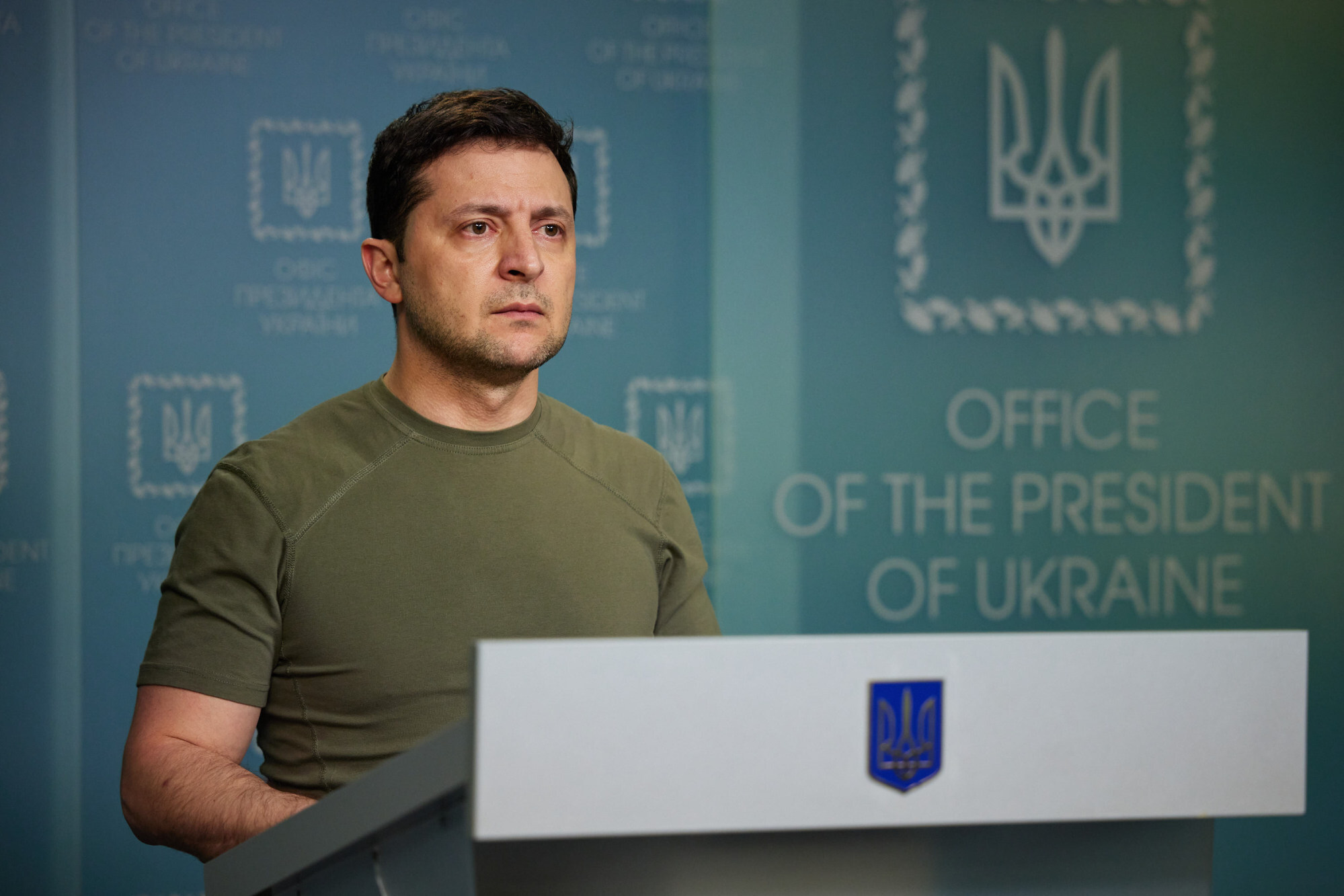
The presidential adviser said Zelensky would remain in Kyiv, even after the French Foreign Minister Jean-Yves Le Drian had suggested Paris would assist him in leaving if necessary.
“The sole goal is to enter Kyiv and destroy the leadership of Ukraine, personally Volodymyr Zelensky,” Podolyak said.
Russia describes Ukraine government as ‘neo-Nazis’
The Russian embassy in Beijing has hit out at Kyiv’s “neo-Nazi regime and its friends in the West”.
A note to media laid the blame for the “special operation” at the feet of Ukraine.
It referred to the invasion as a “peacekeeping operation”, adding that it “aimed to stop Ukrainian neo-Nazis and their genocide against 4 million ethnic Russians in Donbas”.
It added: “Do not help them as they deserve nothing but trial for their war crimes. Do not be fooled again.”
Such language have been flatly denied by governments around the world, which have roundly condemned Russia’s actions.
An EU official said of Russia’s claims: “Putin talks about denazifying Ukraine, but he is behaving like a Nazi. He talks about committing genocide, but he’s about to commit genocide.”
However, the Chinese government has declined to call it an “invasion”, instead accusing the West of “jumping to conclusions”.
Johnson speaks with Zelensky
Britain’s Prime Minister Boris Johnson said he expressed Britain’s solidarity with Ukraine in a call with Zelensky on Friday morning.
Zelensky provided an update on the most recent Russian advances while Johnson said the world was “united in its horror” over Russia’s actions, Downing Street said.
“The prime minister committed to provide further UK support to Ukraine in the coming days as the people of Ukraine and the world continue to demonstrate that Putin cannot act with impunity,” the statement added.
Chinese urged to avoid camouflage outfits
Chinese nationals in Ukraine should observe curfew orders and refrain from wearing camouflage outfits, according to a statement by China’s ambassador to Ukraine.
“As the situation further worsens, please step up security prevention measures,” the notice said, adding that people should identify their nearest shelter as bombing continues.
“Ukraine police have notified local citizens to report any suspicious figures and asked civilians to refrain from wearing camouflage and tactical outfits,” the statement said.
Additional reporting by Mark Magnier, Ian Young and Jacob Fromer




